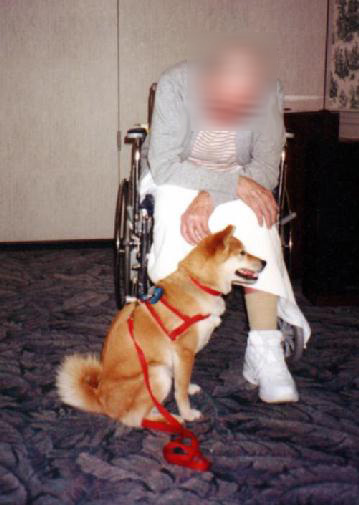 ShibaSports
ShibaSports
 ShibaSports
ShibaSports
Warning - Info on this page may be out of date. Updates coming soon!
Therapy Dog
 Studies have found a definite correlation between animal therapy and emotional health. Petting a dog can lower blood pressure, relieve stresses and also ease loneliness and depression. Sharing your companion through therapy dog activities takes very little time out of your day but the rewards to all involved are immense. Shibas do make wonderful Therapy Dogs. Everyone they touch or who touches them benefits greatly from the warmth and compassion they have to share.
Studies have found a definite correlation between animal therapy and emotional health. Petting a dog can lower blood pressure, relieve stresses and also ease loneliness and depression. Sharing your companion through therapy dog activities takes very little time out of your day but the rewards to all involved are immense. Shibas do make wonderful Therapy Dogs. Everyone they touch or who touches them benefits greatly from the warmth and compassion they have to share.
 There are many organizations throughout the US and Canada working with animal therapy. Find one convenient to you that will work well for you and your companion. Each organization follows their own guidelines, training and testing. Some include insurance coverage for their members. Each has their own programs to help you after you have passed your testing and evaluation.
There are many organizations throughout the US and Canada working with animal therapy. Find one convenient to you that will work well for you and your companion. Each organization follows their own guidelines, training and testing. Some include insurance coverage for their members. Each has their own programs to help you after you have passed your testing and evaluation.
Following is an summary of screening and testing conducted by an evaluator who has been trained to determine the acceptance of dog and handler to the program. There are many variations, depending on the organization, and this is sampling of exercises which might be used in testing. There is no specific order in which these excises are given, this also depends on the organization and the evaluator. Some organizations include all of these exercises in testing while others may use some of their own. Again, it depends on the organization, what type of therapy work you are being evaluated for and what guidelines the organization follows.
 The test and evaluation is divided into 3 parts: Health, CGC Test and Temperament Test
The test and evaluation is divided into 3 parts: Health, CGC Test and Temperament Test
Health
All animals must be healthy. They must pass a physical exam given by their Veterinarian, be current on all vaccinations and free of internal and external parasites. A health form signed and completed by a licensed Veterinarian is required.
CGC Test
Each dog and handler must pass the AKC Canine Good Citizen Test which has added health care equipment such as wheelchairs, walkers and/or canes. The evaluator will test the ability of the dog and handler to work in areas such as hospitals, nursing homes or schools where this equipment would be encountered. Food treats cannot be used in this test.
This site contains a detailed description of the CGC Test.
Temperament Testing

This part of the test determines if the dog has the ability and potential to participate in therapy dog activities. The evaluator also determines the dog and handler's ability to work as a team
Therapy Dog Organizations
Two of the organizations that are recognized throughout the US are:
Therapy Dog International, Inc (TDI): http://www.tdi-dog.org/
Pet Partners (formerly Delta Society): http://http://www.petpartners.org/
If you would like more information on these organizations, you can contact them by email or contact an Obedience Club, Kennel Club or Animal Shelter in your area to find the organization nearest you.
Page contributed by Carolyn Sanford